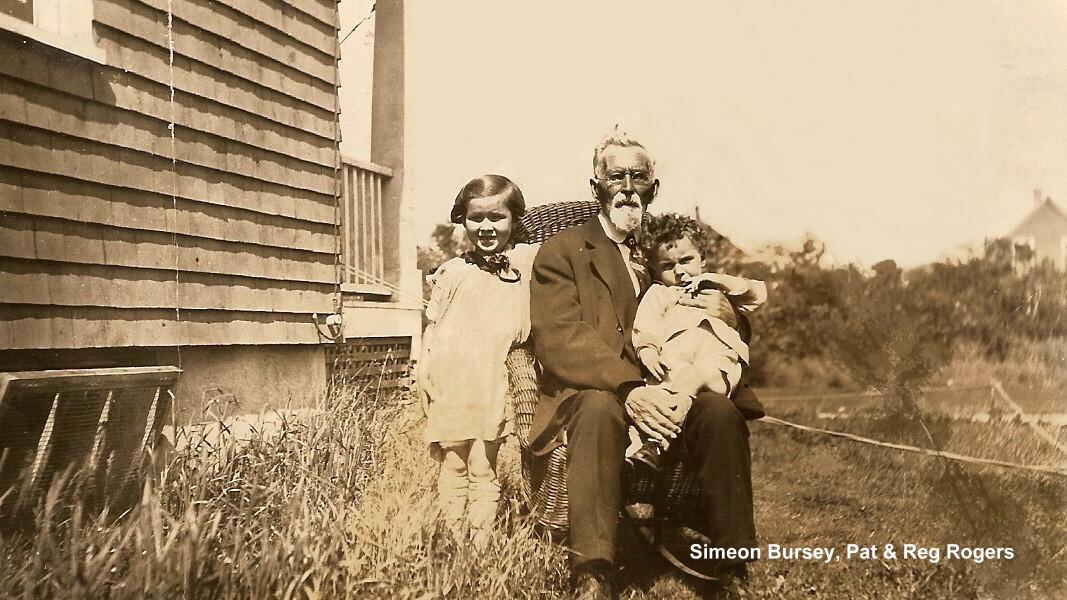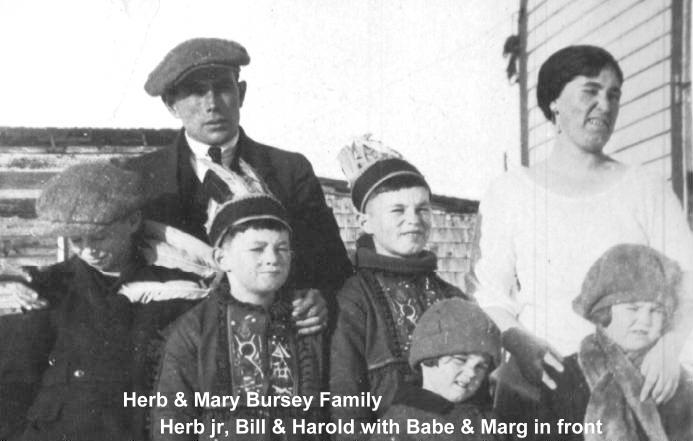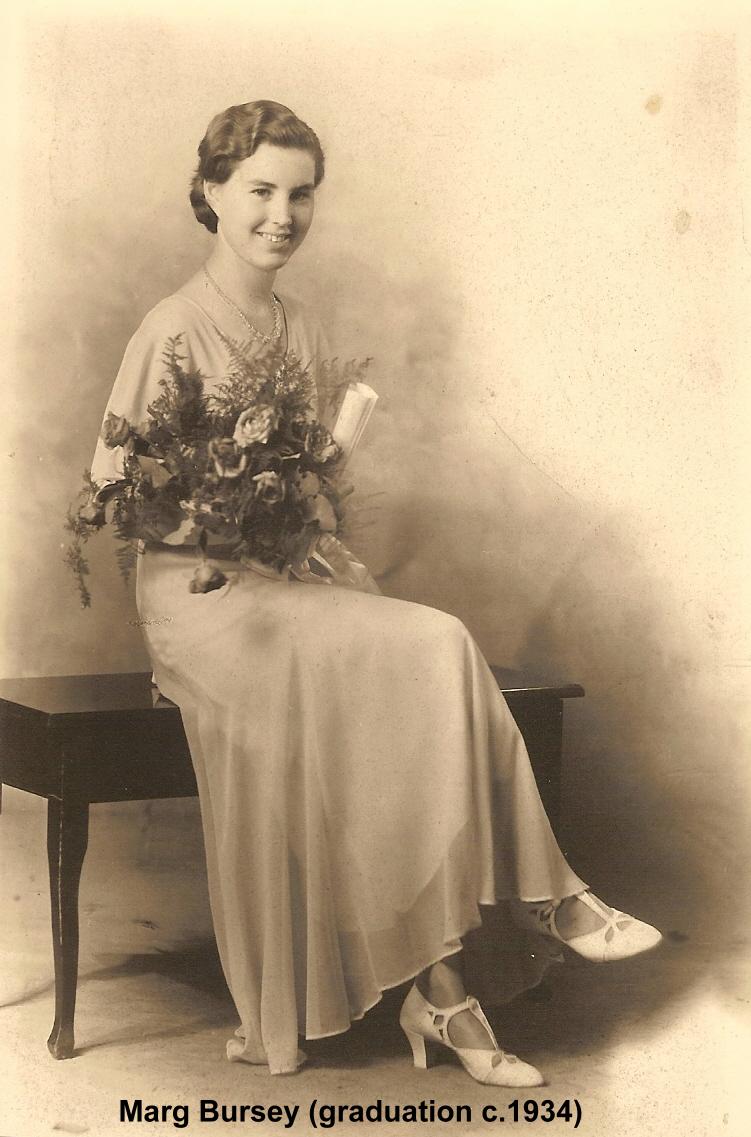|
Bursey's first came to North America to follow the Newfoundland fishery. They settled on the east coast of Newfoundland, all around Trinity Bay, where there were many good harbours and cod fish was in great abundance. Uriah Mitchell Bursey came to Trinity Bay in 1748 and settled in the small community of Old Perlican. Old Perlican is located on the south shore of Trinity Bay and was first discovered by Sir Francis Drake around 1577. His ship (The Golden Hind) was first named "The Pelican". It is thought by some that the name Old Perlican is derived from this. However there is a town in England named Perlican from which Old Perlican is linked.
The early 1600's had brought England's West County fishermen to Newfoundland during the cod fishing season (June - September). Then in the early 1700's the "planters" came to stay through the year. These were fishermen who settled down, built homes, fished and raised families. The families were supplied by "Sack Ships" from England who brought food, clothing and equipment in trade for dried fish. The ships came from such ports as Poole, London, Southampton,and Dartmouth. A trade triangle was created between Portugal(salt), West Indies(molasses and spices), and Newfoundland(dried fish). This is how Trinity Bay got it's name(triangle).
Early English parish records on file at the Maritime History Archives, St. John's indicate the Bursey's of Newfoundland came from the West Counties of England. Parish records show Bursey's in the County of Dorset( ports of Poole & Ringwood), Hampshire County( Christchurch), County of Devon (Denbury & Marychurch). However, one of the oldest existing record books of Newfoundland business states " Uriah Mitchell Bursey came to Old Perlican in 1748 from Manchester, England". This record book "the Warn Ledger" holds the business records of Old Perlican for the period 1749 -1759 and is held in The Provincial Archives in St. John's.
The names of the early Bursey's to Newfoundland are found in church records held at the Provincial Archives in St. John's. Also the two books, "As We Were" history of Old Perlican by Fred Cram and "Bursey's Of Newfoundland" by Mitchell Bursey contain listings of the early settlers to Old Perlican.
If we can assume that Uriah Bursey came to Newfoundland as a young man he was probably born approximately 1730. He came from Manchester England in 1748 as indicated in the Warn Ledger. Not long after his arrival he married and began raising a family. Their children were Uriah b.1749, Catherine b.1752 d.1841 and Richard b.1750 d.1836. It can be assumed that they were god fearing people as the baptisms of their children were all recorded in the Wesleyan Methodist Baptismal records.
Richard Bursey, son of Uriah, grew up in the village working with his father on the fishing boats and preparing the cod fish for market. Like all families they had a large garden and raised a few goats and chickens. Records show that he married and had a family. The children were Richard b.1778 d.1857, William b.1781 d.1861, and James b.1789 d.1865.
James Bursey was the oldest son of Richard. He grew up in Old Perlican where he met and married a girl named Mary. Their children were James, May, John, Jane, and Richard who was born 4 Aug, 1816.
Richard Bursey, son of James, grew up in Old Perlican as well. Here he married Judith Pike and raised a family of six. Their children were Selena b.20 May,1832, Athaliah b.10 Aug, 1834, James b.18 May,1839, Edmund b.24 Dec,1843, John b.15 Apr,1850 and Simeon b. 30 Sept,1841.
 Simeon Bursey worked with his father on the fishing boats and longed for the day he could become owner and captain of his own fishing schooner. Through hard work and dilligence he eventually bought his own boat. He was nearly thirty years of age when he met Druscilla Short from Hants Harbour. She was just a young lass (born 12 Feb,1852) but she fell in love with this strapping man who had his own fishing boat. Druscilla was born in Hants Harbour to parents Nicholas and Mary Short ( nee Mary Ann Maidment). Her great-grandfather (Samuel Short) came to Hants Harbour in the 1750's from Devonshire, England. He was a wealthy English planter who had established a large fishing station in the centre of the harbour which became known as Short's Point. Simeon Bursey worked with his father on the fishing boats and longed for the day he could become owner and captain of his own fishing schooner. Through hard work and dilligence he eventually bought his own boat. He was nearly thirty years of age when he met Druscilla Short from Hants Harbour. She was just a young lass (born 12 Feb,1852) but she fell in love with this strapping man who had his own fishing boat. Druscilla was born in Hants Harbour to parents Nicholas and Mary Short ( nee Mary Ann Maidment). Her great-grandfather (Samuel Short) came to Hants Harbour in the 1750's from Devonshire, England. He was a wealthy English planter who had established a large fishing station in the centre of the harbour which became known as Short's Point.
Simeon and Druscilla were married in Hants Harbour on 4 Dec, 1873 by Rev. Joseph Hale with witnesses Nicholas Short and Benjamin Pelly. They settled in Hant's Harbour, built their own home and began raising a family. Their children were Bertha, Absolam, Minnie, Mary, Edgar, Nicholas, Simeon, Herbert, Alfred, Arthur, and Annie.
Herbert Cecil Bursey (my grandfather), born August 9/1888, grew up with the hard times that came with the Newfoundland fishery. As a young man he worked with his father and brothers on their fishing schooner. During those years they followed the cod to the Labrador coast where each year they would fish the entire summer. A summer camp was set up in a sheltered cove where the fish were dried on racks. By fall the dried fish was loaded and transported to the buyers in Hant's Harbour. Here the summer's harvest of dried fish was traded for dry goods, food and clothing.
More than once their schooner got caught in a gale. Simeon would send the boys below to the shelter of the cabin, then tie himself to the wheel house to prevent being washed overboard. They survived many storms but Simeon was getting on in years (now 62) and times were changing.
The price of cod had hit bottom and Priscilla worried about the dangers of the sea that her young sons would be facing. So it was in 1904 they sold their boat and home and moved to Moncton, New Brunswick. Simeon was an able carpenter and Moncton was becoming a booming railway town. Here they lived their remaining years in a life full of love and happiness. Eventually Druscilla became crippled with arthritis and was bedridden for many years. Simeon cared for her until he was nearly 85. When her care became too much for him he moved Druscilla into the home of their son. Every day Simeon would walk over to be with her through the day. After Druscilla died in 1926 Simeon pined himself away and in only a few months he died of a broken heart.
My grandfather, Herbert Bursey was a young man of sixteen at the time the family moved to Moncton. His goal in life was to become a tradesman with the fast expanding Intercolonial Railway with headquarters in Moncton. He soon became a pipefitter apprentice and later earned his journeymans papers working on the large steam locomotives at the CNR roundhouse. It was here that he spent most of his working life (over forty years).
 By 1911 Herbert had met and married Mary Willis who lived in the Lewisville area on the Shediac Road. She was eldest of three children of William and Mary Ann (Hones) Willis who in 1904 had immigrated to Canada from England. The Willis family had built a modest home in this country setting on the Shediac Road. When the Great War of 1914 - 1918 broke out. All British citizens were encouraged to help defend their country. William Willis, even though he was retired and too old to enlist in the army, returned to England with his family to serve in the home guard for the duration of the war. Herbert and Mary, with their young family moved into the Willis house during this period. Herbert and Mary raised a family of five children: Herbert F., Harold W., William Edwin, Margaret Louise(my mother), and Miriam K.(Babe). After the war, as the Willis family was packing to return to Canada, William had a stroke and died. Mary Ann and the two children(Miriam and Bill) returned to Moncton. Herbert and Mary bought the house on Shediac Road, added an extension, a few barns and settled in for the long haul. A large garden plot was cultivated which supplied them with vegetables. They lived a frugal and god fearing life. By 1911 Herbert had met and married Mary Willis who lived in the Lewisville area on the Shediac Road. She was eldest of three children of William and Mary Ann (Hones) Willis who in 1904 had immigrated to Canada from England. The Willis family had built a modest home in this country setting on the Shediac Road. When the Great War of 1914 - 1918 broke out. All British citizens were encouraged to help defend their country. William Willis, even though he was retired and too old to enlist in the army, returned to England with his family to serve in the home guard for the duration of the war. Herbert and Mary, with their young family moved into the Willis house during this period. Herbert and Mary raised a family of five children: Herbert F., Harold W., William Edwin, Margaret Louise(my mother), and Miriam K.(Babe). After the war, as the Willis family was packing to return to Canada, William had a stroke and died. Mary Ann and the two children(Miriam and Bill) returned to Moncton. Herbert and Mary bought the house on Shediac Road, added an extension, a few barns and settled in for the long haul. A large garden plot was cultivated which supplied them with vegetables. They lived a frugal and god fearing life.
Herb never owned a car but had a horse and buggy for a short time. He would walk to Humphrey's Mills(2 miles) each day to catch the train into work at the roundhouse. In fact Herb was known to walk the full distance (5miles) to work when the trains weren't running(during snow storms). In his later years his hip would give him much pain and he had a serious limp. During the depression of the nineteen thirties there were hard times but he felt lucky to be working. The family grew up happy and healthy and were soon all working. When World War II broke out William Bursey enlisted with the RCAF and became a gunner on Lancaster bombers. He received special mention in dispatches for his extended tour of duty over enemy territory.
His mother Mary never thought he would survive the war and worried tremendously. This stress, it is thought, contributed to her early death in 1947 at the age of fifty-five. The other boys had good jobs with Canadian National Railways - Harold, as a brakeman and Herb(junior) as an acountant. Babe(Miriam) would become a teacher and spend the war years waiting for her new husband Bill Fowler to return from the war in Europe.
 My mother, Margaret Louise Bursey, was born July 11, 1916 and attended grade school in Lewisville. After graduating from Edith Cavell High School in Moncton she worked at the T. Eaton Company. She was shy, pretty as a picture and had a winning way with everyone she met. Margaret loved nature and was a talented sketch artist. When Ralph Lockhart Scribner was introduced to her, it was love at first sight. They married in 1939 and for the next thirty-two years raised a large family of nine(5 boys and 4 girls). . Ann was born in 1940 became a registered nurse, Nancy born in 1942 also became a registered nurse, Ralph born in 1944 became an electronics technician, David born in 1945 became a Master Warrant Officer with the Canadian Army, Michael born in 1947 became a Civil Engineer, Peter born in 1950 became a police officer , Susan born in 1953 became a teacher, Catherine born in 1955 became a Secretary, Stephen Lea born in 1957 died at the age of four. My mother, Margaret Louise Bursey, was born July 11, 1916 and attended grade school in Lewisville. After graduating from Edith Cavell High School in Moncton she worked at the T. Eaton Company. She was shy, pretty as a picture and had a winning way with everyone she met. Margaret loved nature and was a talented sketch artist. When Ralph Lockhart Scribner was introduced to her, it was love at first sight. They married in 1939 and for the next thirty-two years raised a large family of nine(5 boys and 4 girls). . Ann was born in 1940 became a registered nurse, Nancy born in 1942 also became a registered nurse, Ralph born in 1944 became an electronics technician, David born in 1945 became a Master Warrant Officer with the Canadian Army, Michael born in 1947 became a Civil Engineer, Peter born in 1950 became a police officer , Susan born in 1953 became a teacher, Catherine born in 1955 became a Secretary, Stephen Lea born in 1957 died at the age of four.
|
